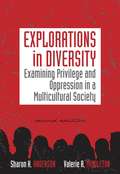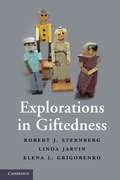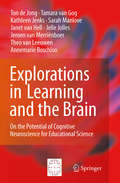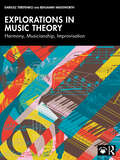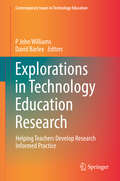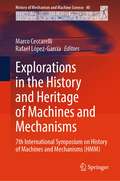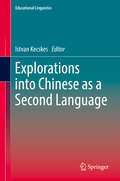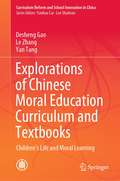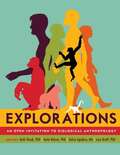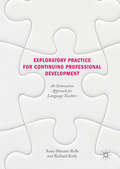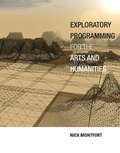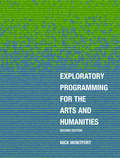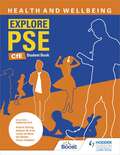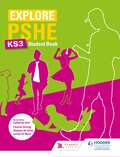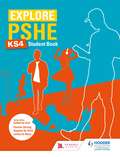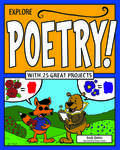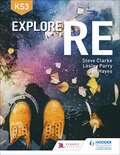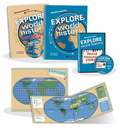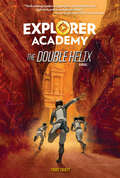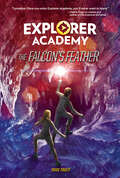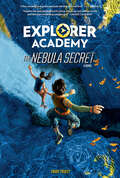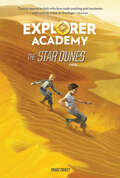- Table View
- List View
Explorations in Diversity: Examining Privilege and Oppression In A Multicultural Society (Second Edition)
by Sharon K. Anderson Valerie A. MiddletonThis unique text features personal accounts from mental health professionals, professors and students facing issues of privilege and oppression in our diverse society. In this collection of articles, writers discuss discoveries and experiences about their own privileges and oppression, and ultimately, the compassion they've developed for individuals confronted with discrimination. Each essay will inspire you to reflect on your own encounters with privilege and oppression, while discussion questions at the end of each story provide an opportunity to process these issues on a personal level. By studying these revealing stories of insight and understanding, you'll learn how to recognize, examine, and finally, come to terms with your own privileges and discrimination -- allowing you to become a stronger, more acute, and more effective practitioner of the helping professions.
Explorations in Giftedness
by Robert J. Sternberg Elena L. Grigorenko Linda JarvinThis book is a scholarly overview of the modern concepts, definitions, and theories of intellectual giftedness, and of past and current developments in the field of gifted education. The authors consider, in some detail, the roles of intelligence, creativity, and wisdom in giftedness and the interaction between culture and giftedness, as well as how giftedness can be understood in terms of a construct of developing expertise. The authors also review and discuss a set of key studies that address the issues of identification and education of children with intellectual gifts. This volume may be used as a summary overview of the field for educators, psychologists, social workers, and other professionals who serve intellectually gifted children and their families.
Explorations in Learning and the Brain
by Theo Van Leeuwen Tamara Van Gog Ton De Jong Janet Van Hell Kathleen Jenks Annemarie Boschloo Jeroen Van Merrienboer Sarah Manlove Jelle JollesThe past decade has witnessed efforts on the part of research, education and policy communities to create a dialogue about the potential relationship between cognitive neuroscience and the science and practice of education. The upsurge of interest in neuroscience in general has given rise to increased attention to the role of the brain in learning. However, much of the debate has been dominated by extremes. Explorations in Learning and the Brain takes a different stance in the sense that developments within neuroscience are not the starting point but rather uses major questions dominant in educational research, notably instructional systems design and related fields within the educational sciences, as its basis. The book identifies interfaces between neuro-scientific and educational research, and informs on potentially interesting additions to educational research and viable interdisciplinary ventures.
Explorations in Music Theory: Harmony, Musicianship, Improvisation
by Dariusz Terefenko Benjamin WadsworthExplorations in Music Theory: Harmony, Musicianship, Improvisation offers an innovative learning approach to music theory, centered on instrumental skills, improvisation, and composition. Providing a comprehensive textbook to support music theory curricula, along with an accompanying workbook, it includes extensive performance-based exercises in each chapter, alongside written theory and analysis. This book teaches harmony as a series of historical practices, each with different advantages and disadvantages. Classes are empowered to critically compare these practices and adopt those that they find most effective. Designed to support multiple learning modalities, and incorporating repertoire from a diverse array of composers, this book offers instructors and students a comprehensive and engaging foundation in music theory.Features of this book include: Modular lessons centered on inquiry-driven pedagogy, offering flexibility Lesson difficulty is marked to allow instructors to easily organize their course A wide variety of exercises and practice tasks incorporated throughout the chapters Improvisation Labs allow students to practice concepts through improvisation Historical Minutes introduce students to historical theorists and enable them to understand music theory as a living practice Composer Spotlights highlight the stories of composers whose work is featured in the chapter, bringing forward underrepresented composers Explore Online features provide additional exercises and coverage of advanced topics through an accompanying online resource A flexible, modular organization allows the book to be used in a variety of course structures, accommodating a wide variety of schools. Enhancing improvisation and composition skills, introducing historical perspectives, incorporating diverse repertoire, and enabling students to better connect theory concepts with practical applications, this text provides a new and effective way to teach harmony.
Explorations in Technology Education Research: Helping Teachers Develop Research Informed Practice (Contemporary Issues in Technology Education)
by P John Williams David BarlexThis volume brings together significant international research in technology education by focusing on contemporary postgraduate research, elaborating on the findings with the aim of making the content relevant to researchers, teachers and other potential researchers in the field. The book shares with readers what the research means for classroom teachers through understanding different motivations for teaching technology in schools and observing the model of learning supported by the research. Each chapter in the book includes references to the digital edition of the respective full thesis, allowing readers to consult the research in detail if necessary. This book continues the work done by 2017's Contemporary Research in Technology Education by the same editors.
Explorations in the History and Heritage of Machines and Mechanisms: 7th International Symposium on History of Machines and Mechanisms (HMM) (History of Mechanism and Machine Science #40)
by Marco Ceccarelli Rafael López-GarcíaThis book gathers the latest advances in the field of history of science and technology, as presented by leading international researchers at the 7th International Symposium on History of Machines and Mechanisms (HMM), held in Granada and Jaén, Spain on April 28-30, 2022. The Symposium, which was promoted by the permanent commission for the History of Machine and Mechanism Science (MMS) of IFToMM, provided an international forum to present and discuss historical developments in the field of MMS. The contents cover all aspects of the development of MMS from antiquity until the present era and its historiography: modern reviews of past works, engineers in history and their works, the development of theories, history of the design of machines and mechanisms, historical developments of mechanical design and automation, historical developments of teaching, the history of schools of engineering, the education of engineers. The contributions, which were selected by means of a rigorous international peer-review process, highlight numerous exciting ideas that will spur novel research directions and foster multidisciplinary collaborations.
Explorations into Chinese as a Second Language
by Istvan KecskesThis volume explores how linguistic research can support the teaching and learning of Chinese as a second language. It responds to a rapidly growing interest in the Chinese language all over the world, and answers the need for a strong research background for the discipline. Without that, Chinese language learning remains only a unique experience and/or a useful education challenge. The first section explores crucial issues about the structure and use of Chinese as a Second Language such as word-order, noun-noun compounds, meaning-making in writing, pronunciation and stress and tone. The second section explores the learning of Chinese by seeking answer to questions about difficulties, expectations, beliefs, use of corpus and learning how to express necessity. The authors coming from eight different countries demonstrate how existing knowledge has been generated, bring together different lines of research, point out tendencies in the field, demonstrate and explain what tools and methods researchers can use to address major issues in the field, and give direction to what future research should focus on.
Explorations of Chinese Moral Education Curriculum and Textbooks: Children’s Life and Moral Learning (Curriculum Reform and School Innovation in China)
by Le Zhang Yan Tang Desheng GaoThis book shares with English readers Chinese theoretical and practical explorations of moral education curriculum for primary schools within the basic education curriculum reform project since 2001.The book expounds this moral education curriculum reform and focuses on three main ideas: The curriculum’s aim is to enrich children’s experiences and reflect their own lives; the curriculum’s content is originated from children’s lives; the curriculum’s structure is developed from children’s learning approach in their morality and social study. In this book, light is also shed on how to construct moral education textbooks, direct moral instruction, and moral teacher identity in the perspective of moral learning; how to knit law education and Chinese traditional culture education in moral curriculum.This is the first comprehensive book focusing on Chinese moral education curriculum reform. It will appeal to researchers, research students, and writers of moral education textbooks. It is also suitable for teacher training programs to help future teachers learn about moral education curriculum and help them effectively design and organize it for children’s morality study.
Explorations: An Open Invitation To Biological Anthropology
by Katie Nelson Beth Shook Kelsie AguileraWelcome to Explorations and biological anthropology! Mission Statement: To provide a high-quality introductory biological anthropology textbook that is readable, engaging, and accessible to all students. With chapters written by experienced instructors and subject area specialists, this textbook addresses the question of what it means to be human by exploring the origins, evolution, and diversification of primates, especially that of our species, Homo sapiens. Anthropology is the study of humanity, in all its biological and cultural aspects, past and present. It is a four-field discipline comprised of biological anthropology, cultural anthropology, archaeology, and linguistic anthropology. The focus of this book is biological anthropology, which explores who we are from biological, evolutionary, and adaptive perspectives. We lay the foundation for this inquiry in the first four chapters by introducing the discipline of anthropology, evolutionary theory, molecular biology and genetics, and the forces of evolution. An electronic version of this textbook is available free of charge at the Society for Anthropology in Community Colleges' webpage here: www.explorations.americananthro.org
Exploratory Practice for Continuing Professional Development: An Innovative Approach for Language Teachers
by Assia Slimani-Rolls Richard KielyThis book explores the use of Exploratory Practice (EP) as a tool for Continuing Professional Development (CPD) by language teachers, and responds to the increasing demand for teachers to engage in research. It presents the results of a unique two-year longitudinal study that critically examines the implementation of EP by teachers of English and modern foreign languages. Through these case studies, the authors provide a critical account of EP as a form of practitioner research that bridges the divide between theory and practice. It emphasizes the centrality of teacher and learner learning in language education curriculum improvement, and gives a voice to teachers’ perspectives on using EP in the classroom. This book will be of interest to language education professionals and scholars working in Applied Linguistics and Language Education.
Exploratory Programming for the Arts and Humanities
by Nick MontfortA book for anyone who wants to learn programming to explore and create, with exercises and projects to help the reader learn by doing.This book introduces programming to readers with a background in the arts and humanities; there are no prerequisites, and no knowledge of computation is assumed. In it, Nick Montfort reveals programming to be not merely a technical exercise within given constraints but a tool for sketching, brainstorming, and inquiring about important topics. He emphasizes programming's exploratory potential—its facility to create new kinds of artworks and to probe data for new ideas. The book is designed to be read alongside the computer, allowing readers to program while making their way through the chapters. It offers practical exercises in writing and modifying code, beginning on a small scale and increasing in substance. In some cases, a specification is given for a program, but the core activities are a series of “free projects,” intentionally underspecified exercises that leave room for readers to determine their own direction and write different sorts of programs. Throughout the book, Montfort also considers how computation and programming are culturally situated—how programming relates to the methods and questions of the arts and humanities. The book uses Python and Processing, both of which are free software, as the primary programming languages.
Exploratory Programming for the Arts and Humanities, second edition
by Nick MontfortA new edition of a book for anyone who wants to learn programming to explore and create, with exercises and projects to help readers learn by doing.This book introduces programming to readers involved with the arts and humanities; there are no prerequisites, and no previous knowledge of programming is assumed. Nick Montfort reveals programming to be not merely a technical exercise within given constraints but a tool for sketching, brainstorming, and inquiry. He emphasizes programming's exploratory potential--its facility to create new kinds of artworks and to probe data for new ideas. The book is designed to be read alongside the computer, allowing readers to program while making their way through the chapters. It offers practical exercises in writing and modifying code and outlines "free projects" that allow learners to pursue their own interests.
Explore PSE: Health and Wellbeing for CfE Student Book
by Ian Geddes Calum Campbell Stephen De Silva Pauline Stirling Lesley de MezaSyllabus: CfE (Curriculum for Excellence, from Education Scotland) and SQALevel: BGE S1-3 (Second, Third and Fourth Levels), National 4 and National 5Subject: PSE (Health and Wellbeing)Empower Scotland''s young people to feel prepared for the opportunities and challenges of adult life.Exploring topics such as mental health, sex, identity, community and planning for your future, this book develops students'' life skills, knowledge and resilience as they learn about themselves and others.> Create a supportive environment where sensitive issues can be discussed confidently and constructively, using the book to provide stimulus material and structure> Follow an active learning approach with starter activities to get students thinking, visual sources and written extracts to encourage conversations, and hundreds of activities for individual, pair and group work> Monitor students'' progress through learning outcomes for each lesson/series of lessons and numerous activities that create opportunities for assessment for learning and evidence of achievement> Suit your students and your timetable, with topics that can be covered in any order and double-page spreads that can be delivered across one or two lessons> Rest assured that all content in the book is linked to the CfE Benchmarks and Experiences & Outcomes for Health and Wellbeing: Personal and Social Education, as well as the GIFREC and SHANARRI principles
Explore PSE: Health and Wellbeing for CfE Student Book
by Ian Geddes Calum Campbell Stephen De Silva Pauline Stirling Lesley de MezaSyllabus: CfE (Curriculum for Excellence, from Education Scotland) and SQALevel: BGE S1-3 (Second, Third and Fourth Levels), National 4 and National 5Subject: PSE (Health and Wellbeing)Empower Scotland's young people to feel prepared for the opportunities and challenges of adult life.Exploring topics such as mental health, sex, identity, community and planning for your future, this book develops students' life skills, knowledge and resilience as they learn about themselves and others.> Create a supportive environment where sensitive issues can be discussed confidently and constructively, using the book to provide stimulus material and structure> Follow an active learning approach with starter activities to get students thinking, visual sources and written extracts to encourage conversations, and hundreds of activities for individual, pair and group work> Monitor students' progress through learning outcomes for each lesson/series of lessons and numerous activities that create opportunities for assessment for learning and evidence of achievement> Suit your students and your timetable, with topics that can be covered in any order and double-page spreads that can be delivered across one or two lessons> Rest assured that all content in the book is linked to the CfE Benchmarks and Experiences & Outcomes for Health and Wellbeing: Personal and Social Education, as well as the GIFREC and SHANARRI principles
Explore PSHE for Key Stage 3 Student Book
by Stephen De Silva Pauline Stirling Lesley de MezaDevelop your students' skills and understanding of PSHE and encourage an active learning approach, all whilst providing essential coverage of the 2020 statutory guidelines.The flexible design of this KS3 student book is compatible with whichever way your school delivers PSHE. User-friendly for both experienced PSHE Leads and for non-specialist teachers, it is packed full lesson outcomes and starter sections, as well as lot of activities students can get involved in.- Provide the right level of knowledge and understanding of PSHE education students need with this KS3 Student Book that has topic suitability for this age range- Learning outcomes at the start of every lesson, along with a short activity to introduce students to the topic and get them thinking provides an easy way in to every lesson- Source-based activities support an activity-based learning scheme that is accessible to students of all abilities
Explore PSHE for Key Stage 3 Student Book
by Stephen De Silva Pauline Stirling Lesley de MezaDevelop your students' skills and understanding of PSHE and encourage an active learning approach, all whilst providing essential coverage of the 2020 statutory guidelines.The flexible design of this KS3 student book is compatible with whichever way your school delivers PSHE. User-friendly for both experienced PSHE Leads and for non-specialist teachers, it is packed full lesson outcomes and starter sections, as well as lot of activities students can get involved in.- Provide the right level of knowledge and understanding of PSHE education students need with this KS3 Student Book that has topic suitability for this age range- Learning outcomes at the start of every lesson, along with a short activity to introduce students to the topic and get them thinking provides an easy way in to every lesson- Source-based activities support an activity-based learning scheme that is accessible to students of all abilities
Explore PSHE for Key Stage 4 Student Book
by Philip Ashton Stephen De Silva Lesley de MezaDevelop your students' skills and understanding of PSHE and encourage an active learning approach, all whilst providing essential coverage of the 2020 statutory guidelines.The flexible design of this KS4 student book is compatible with whichever way your school delivers PSHE. User-friendly for both experienced PSHE Leads and for non-specialist teachers, it is packed full lesson outcomes and starter sections, as well as lot of activities students can get involved in.- Provide the right level of knowledge and understanding of PSHE education pupils need with this KS4 Student Book that has topic suitability for this age range.- Learning outcomes at the start of every lesson, along with a short activity to introduce students to the topic and get them thinking provides an easy way in to every lesson - Source-based activities support an activity-based learning scheme that is accessible to students of all abilities
Explore PSHE for Key Stage 4 Student Book
by Philip Ashton Stephen De Silva Lesley de MezaDevelop your students' skills and understanding of PSHE and encourage an active learning approach, all whilst providing essential coverage of the 2020 statutory guidelines.The flexible design of this KS4 student book is compatible with whichever way your school delivers PSHE. User-friendly for both experienced PSHE Leads and for non-specialist teachers, it is packed full lesson outcomes and starter sections, as well as lot of activities students can get involved in.- Provide the right level of knowledge and understanding of PSHE education pupils need with this KS4 Student Book that has topic suitability for this age range.- Learning outcomes at the start of every lesson, along with a short activity to introduce students to the topic and get them thinking provides an easy way in to every lesson - Source-based activities support an activity-based learning scheme that is accessible to students of all abilities
Explore Poetry!
by Andi DiehnPoems can be silly, serious, or fun, just like kids! Whether it’s the sing-song rhythm of a limerick, the serendipitous magic of a found poem, the deceptive simplicity of a haiku, or the easy familiarity of an acrostic poem, children are charmed by poetry. And what’s more fun than reading poetry? Writing it! In Explore Poetry! With 25 Great Projects children have fun learning about different forms of poetry while delving into different literary techniques such as personification, metaphor, and alliteration, all of which are discussed in a simple and accessible way. Activities include creative writing exercises designed to reinforce language arts skills, plus art projects that encourage children to visualize concepts and definitions. Short biographies of important poets reinforce the concept of poetry as an important part of society. Explore Poetry! meets Common Core State Standards for language arts; Guided Reading Levels and Lexile measurements indicate grade level and text complexity. Informational and inspiring, Explore Poetry! fits seamlessly into the poetry curriculum of grades 2 to 4 and serves as an enrichment resource all during the school year, especially April, Poetry Month.
Explore RE for Key Stage 3
by Jan Hayes Steve Clarke Lesley ParryEngage students with religion, philosophy and ethics at Key Stage 3 and encourage them to develop the skills they need to succeed at GCSE.This accessible Student Book is designed to provide a firm foundation for the reformed GCSE specifications, while still allowing you to teach a broad and balanced KS3 curriculum.- Easily introduce a new scheme of work for KS3 with this cost-effective, single-book course that provides 120 ready-made lessons that can be used flexibly over a 2-year or 3-year KS3- Teach KS3 RE with confidence whatever your level of expertise; this structured course is ready to pick up and teach whether you are an RE specialist or new to teaching the subject- Capture your students' interest with engaging lessons and activities that will encourage them to pursue Religious Education at GCSE- Lay the groundwork for GCSE, equipping your students with a solid grasp of the six major world religions, as well as the core philosophical and ethical issues- Test knowledge and understanding with regular formative assessments that enable students to keep track of their progress throughout the course- Prepare your students for assessment at GCSE, with practice questions for each lesson designed to build the confidence, understanding and evaluative skills needed for GCSE success
Explore World History
by Don Bastian Tom KinneyThe Student Book has 15 chapters divided into 3 types: Keys to History, Historical Eras, and Historical Themes. Key chapters feature World Geography, Study Tools, and Biographies. The 6 Era chapters follow a chronology from Early Humans to Modern Times. Theme chapters focus on major historical concepts, like Agriculture or Trade, and are linked to a particular era. Chapters follow a consistent format: Introduction, Vocabulary, Big Idea, Important Topics, Review, and Write About It. The simplified text is heavily illustrated and intended to be read to students who are nonreaders. Students are frequently presented with important study tools like timelines, maps, and tables.
Explorer Academy: The Double Helix (Explorer Academy)
by Trudi TrueitThe mystery deepens and the action intensifies for 12-year-old Cruz Coronado and friends in the exciting third book in the Explorer Academy series.The adventure continues for Cruz, Emmett, Sailor, and Bryndis as they continue their studies at sea and travel to exotic locations around the world. A mysterious person alerts Cruz to impending danger while he and a few trusted pals explore ancient ruins in Petra, Jordan, and search for another piece of the puzzle his mother left behind. Worst of all, now his father has gone missing, which prompts Aunt Marisol, his number one protector, to leave the ship in search of him. Who is the new professor who takes her place? How does the new technology he introduces help or hurt Cruz's quest? Why is Nebula determined to stop Cruz before he turns 13? The clock is ticking as his first teen birthday draws near ... a milestone that will change his life forever, one way or another.
Explorer Academy: The Falcon's Feather (Explorer Academy)
by Trudi TrueitIt's an adventure of a lifetime when Cruz Coronado sets sail for the shores of Iceland and Norway aboard the Explorer Academy ship to continue his studies at sea. But, things take a turn while exploring the icy north, when he embarks on a dangerous mission to uncover the first piece of an important puzzle his mother left behind.In the exciting follow-up to The Nebula Secret in the 7-book Explorer Academy series, Cruz, Sailor, and Emmett, along with their new ally Bryndis, embark on their first globe-trotting mission aboard the ship Orion. Cruz jumps right back into school and starts using the latest technology in submersible underwater dives, but is soon reminded of the dangers of exploration when his equipment fails and he almost drowns. Determined to keep his eyes on the prize, Cruz sneaks away to try to find answers, but unknowingly lures his friends into bigger trouble. When a friend of Cruz's mom meets an untimely end, Cruz's luck really seems about to run out and the questions multiply. What does the message mean? Where will it lead? Who is following him? And why? This captivating book is the sequel every Explorer Academy fan is waiting to read!
Explorer Academy: The Nebula Secret (Explorer Academy)
by Trudi TrueitAdventure, danger, and a thrilling global mission await 12-year-old Cruz Coronado as he joins an elite school for explorers.Cruz leaves his tranquil home in Hawaii to join 23 talented kids from around the globe to train at the Explorer Academy with the world's leading scientists to become the next generation of great explorers. But for Cruz, there's more at stake. No sooner has he arrived at the Academy than he discovers that his family has a mysterious past with the organization that could jeopardize his future. In the midst of codebreaking and cool classes, new friends and augmented reality expeditions, Cruz must tackle the biggest question of all: Who is out to get him, and why? Readers can get in on the excitement with puzzles and codes embedded throughout.
Explorer Academy: The Star Dunes (Explorer Academy)
by Trudi TrueitCruz, Sailor, Emmett, and the gang are on their way to Africa when Nebula misses their intended target and someone close to Cruz ends up on the brink of death. Secrets creep out from the shadows and leave Cruz with more questions than answers in this fourth title in the hit series.A major discovery forces the Explorer Academy into the limelight in The Star Dunes, but Cruz has much more on his mind than 15 minutes of fame. A new face on board the ship brings Cruz's worlds colliding, just as a major close call tears them apart. En route to Africa, Team Cousteau is now down a major player, and Cruz can't help but be preoccupied by the hole in his life. The discovery of his mom's next clue leads him to the most exotic location yet--a vast desert--with no other information to lead the way, while an unlikely ally helps Cruz pursue another piece of the puzzle. Just as things seem like they might turn out alright, Dr. Fanchon Quills has a technological breakthrough which gives Cruz a glimpse into the past and reveals more about his future than he may really want to know.
